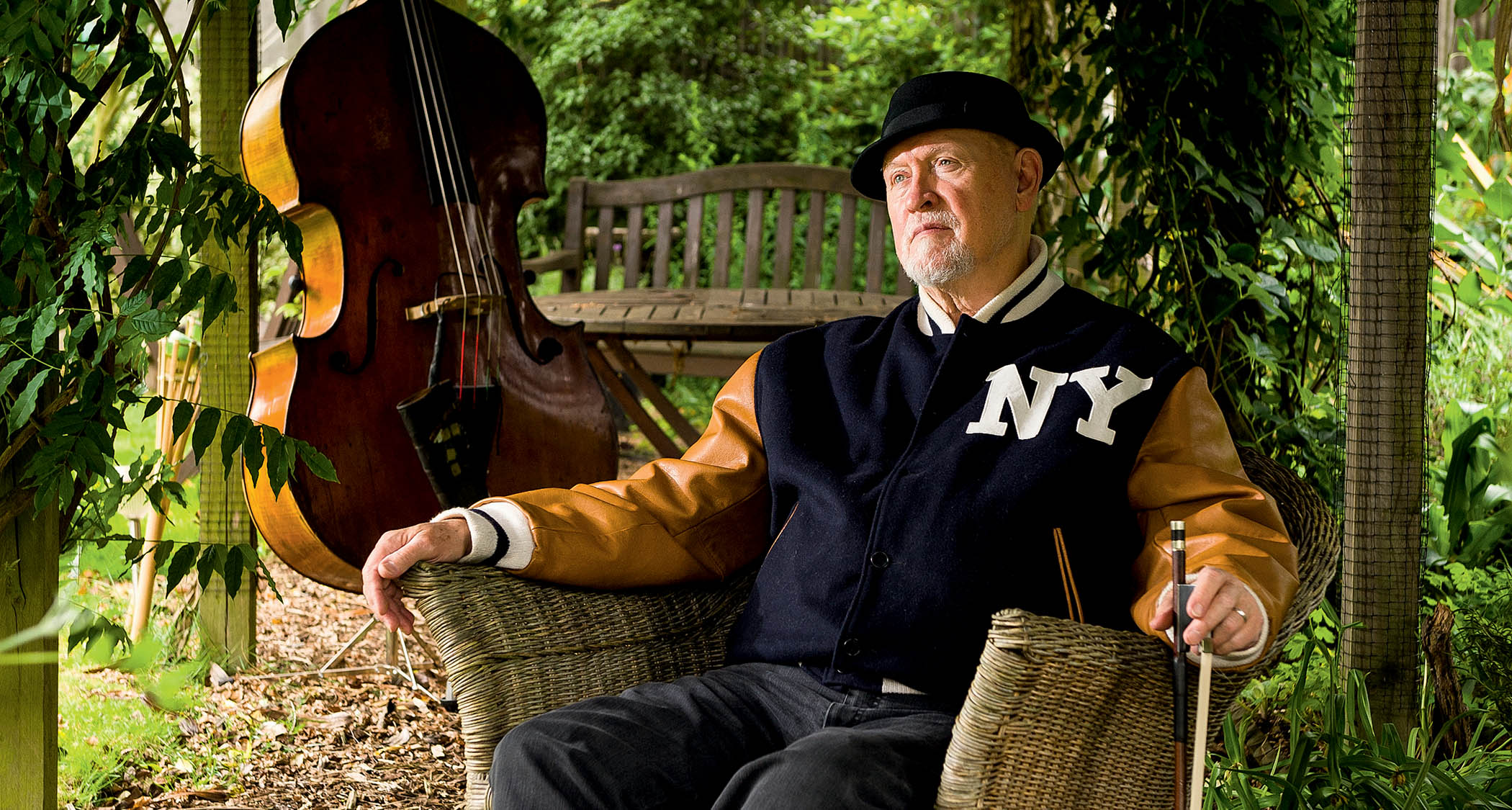Daron Malakian on how System of a Down ended up recording their first new music in 15 years – and what the future holds for the alt-metal icons
In this GW exclusive, Malakian discusses his surprising guitar heroes, how he wrote Chop Suey!, and why he’s never practiced a day in his life

15 years is a long time in rock and roll. That’s how long it’s been since System Of A Down last released new music, though the Grammy-winning Armenian-American quartet have been still headlining festivals and arenas around the world to a loyal fanbase itching for more of their alternative metal anthems.
The two new tracks, Protect The Land and Genocidal Humanoidz, would never have materialized under the SOAD banner if were not for the recently erupted conflict between Armenia and Azerbaijan/Turkey– unleashing the greatest violence the Artsakh region has seen in almost three decades.
Though they’ve managed to raise over $600,000 in donations for the Armenia Fund, in the hours leading up to this interview with guitarist Daron Malakian it was announced that Armenian Prime Minister Nikol Pashinyan had signed a statement with the presidents of Azerbaijan and Russia to end the war in Artsakh, handing over certain districts to the Azerbaijani authorities...
“I don’t have all the details, but we were kinda forced into some kind of agreement that means we’re giving up land,” SOAD’s founding guitarist tells Guitar World. “It’s such a bad situation now – there are 100,000 to 150,000 people that will be displaced and become refugees. Things have gotten even worse over the last couple of days…
“We’ve tried to raise awareness because there is a human catastrophe going on in the world right now and people aren’t paying attention. Some people don’t even know where Armenia is! So of course they’re not going to pay attention to some country they haven’t even heard of.
“We’re lucky enough to be in a band that can spread the message for our people this way. I’m not sure how much we’ve helped the situation judging by the last couple of days, but there’s a lot of people who now know about what’s happening that probably wouldn’t have otherwise.”
Here Malakian explains how the tragedies brought SOAD back together – at least for two new tracks – in aid of a cause very close to their hearts…
All the latest guitar news, interviews, lessons, reviews, deals and more, direct to your inbox!
We heard it was your drummer, John Dolmayan, who got the ball rolling by suggesting a reunion of sorts in the group chat…
“Yeah, he sent a message to the band in a group chat saying we should do something to raise awareness. I had a song I had already recorded and was ready to release with my own album with my other band Scars On Broadway, but the song fit so perfectly for the situation that I had to bring up to the band. So I did that and told them I had this song called Protect The Land…”
Which, despite having been written prior, sounds like it was written specifically for the situation in your ancestral home…
“Yeah, I feel like the lyrics were tailor-made for the situation. I’d actually written the song a year and a half ago, before there was any huge conflict… Well, there’s always been some kind of conflict over the last 20 or 30 years, but not like this. So I had the song ready and everyone told me to send it over, which I did. And it resonated.”
I had the song ready and everyone told me to send it over, which I did. And it resonated
So how did it all get pieced together?
“I sent Serj [Tankian, vocals] the song with all the original tracks done, he was still in New Zealand at the time and he put down some of his vocals. There was a bit of back and forth over text, I would say, ‘Well, maybe try to sing it like this…’ which was kinda different, because I usually work face to face in the same studio with people when sharing ideas.
“He would send things back, I send something back, and so on. Then I got John and Shavo [Odadjian, bass] to get in the studio to track their parts – like I said, I already had the song tracked but we re-tracked everything except for my vocals which remained the same as on the Scars version.”
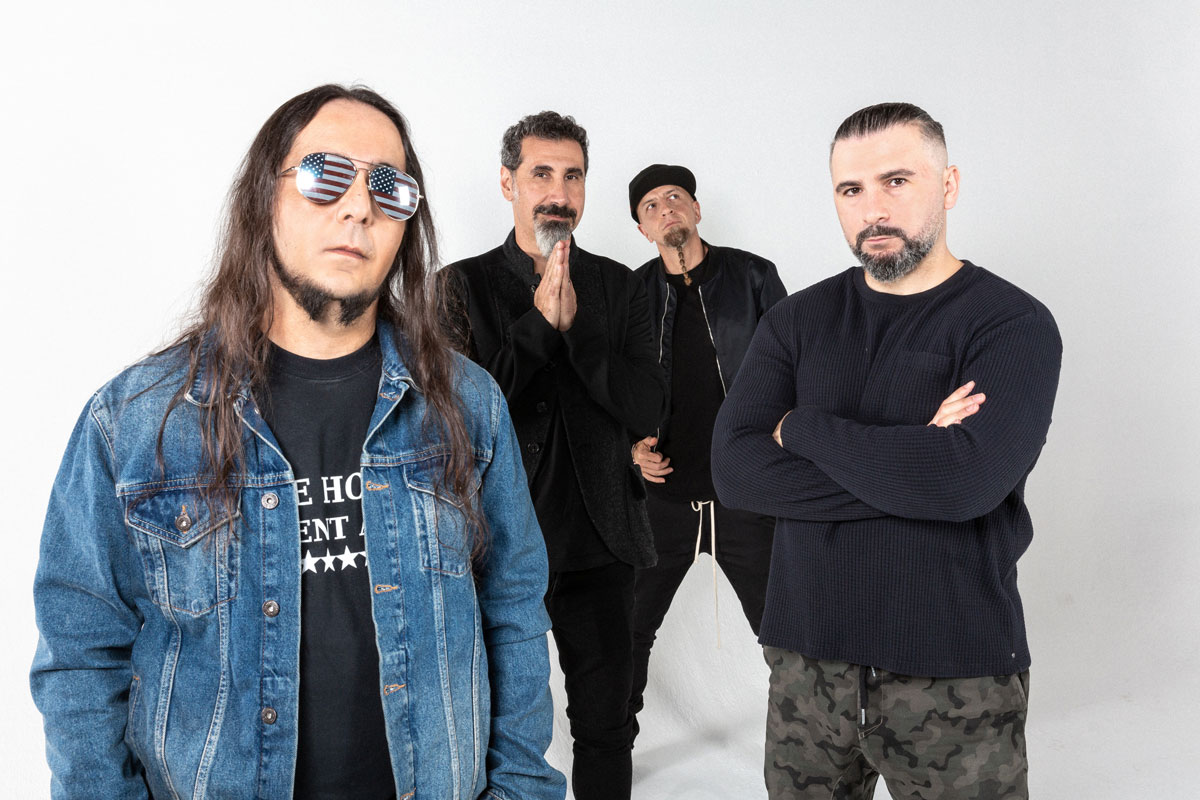
The other new song – Genocidal Humanoidz – is brilliantly unpredictable, even including some black-metal riffing about 90 seconds in…
“I know! But I do try to keep our music in some sort of song format. I try a lot of progressive things, sure, but always keep it as a song. Sometimes when you get too progressive you lose the song and you lose the hook.
“With my writing I usually like to keep it some sort of traditional song structure or format. It might be arranged in a traditional way, but I do have a traditional approach to some degree!”
You’ve mainly used Marshall amps and Gibson and Ibanez guitars over the years. What are we hearing on the new recordings?
“There were no pedals, but I went through a 100-Watt Friedman amplifier that’s very close to a Marshall JMP. I mixed that with a Marshall, which is the bulk of the tone for these two songs.
“And yeah, pretty much all my guitars since Mezmerize and Hypnotize have been recorded with a 1962 LP SG Standard I have. This time I mixed it with an early '80s Gibson Korina Flying V, so it was an SG and Flying V mixed and doubled…”
You were one of the campaign artists for the Marshall Mode Four series – one of the loudest amps to bear their name at a whopping 350 watts. We remember seeing this advert with you lying on two stacks like a bed…
“I actually have the prototype for that amp, they probably forgot they gave me it [laughs]! It doesn’t say Marshall, instead it has sharpie writing on it, so it’s totally the prototype. I’m not sure if they’re aware I still have it [laughs]…
“I’ve always loved Marshall, but I really do like these Friedman amplifiers. The guy that makes them actually used to mod my Marshalls… so when I heard his, I felt they sounded like my modded Marshalls. Which explains why I started using those.
“Aside from that, I’m not much of a gear guy. I pretty much plug my guitar straight into the amp. That’s how I get my sound. I don’t use any compressors or anything like that, it’s really straightforward – guitar, amp and just me playing I guess. It’s never complicated.”
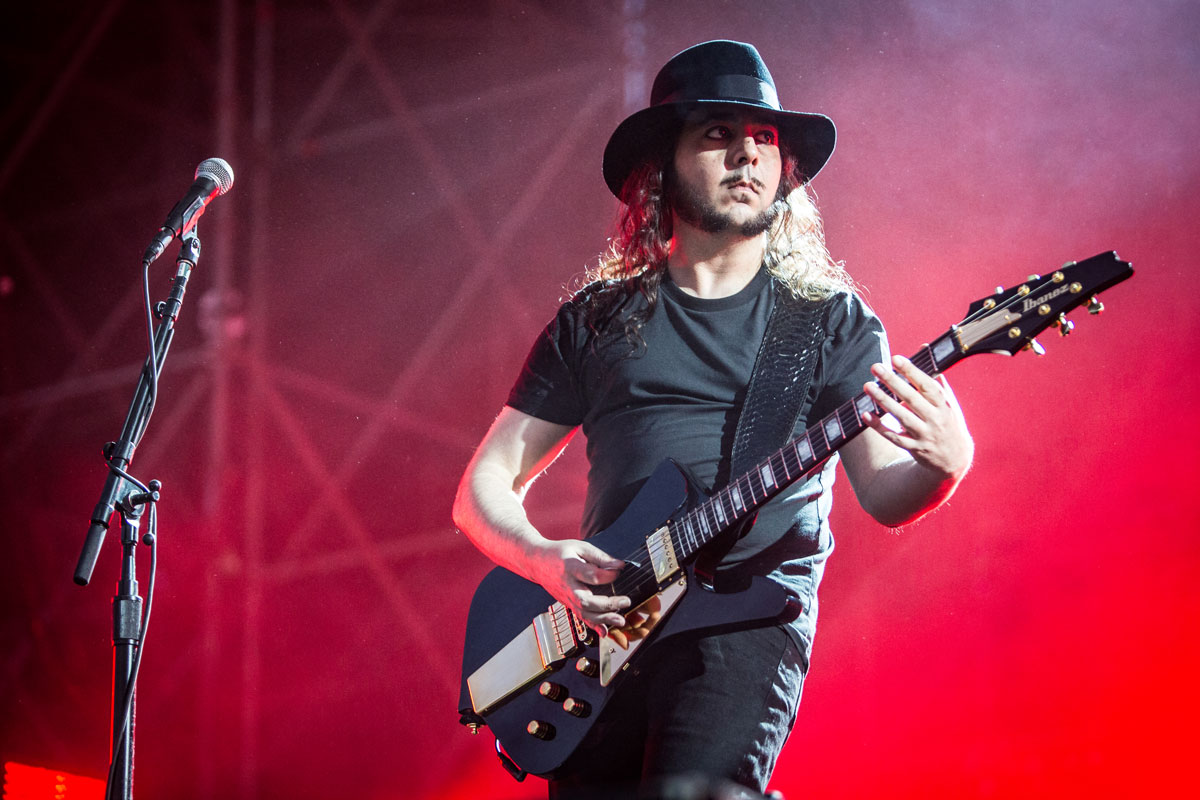
What are the main secrets to the Daron Malakian school of shred – as seen on live renditions of tracks like Psycho, Streamline, Highway Song, Lonely Day, Mr. Jack?
“You know, a lot of my guitar heroes aren’t really the shredder guys. I’m a really big fan of Jerry Garcia. Dudes who aren’t necessarily fast with shredding and sweeping, but more melody-led. When I solo, I like my parts to sing a melody rather than play a bunch of notes really fast over and over again.
“It’s the more simplistic, feel-based players that have influenced me most – and I have so many different influences. A lot of the things I write come from all the things I like meshed in with each other. That’s what creates the style of my songwriting and guitar playing.
“I’m sure a lot of people don’t hear The Grateful Dead in what I do… but I listen to them a lot. In my head, that’s kind what I’m emulating – stuff like that and Neil Young. A lot of people listen to him and think, ‘Oh, he makes his guitar sound like a cat crying!’ But I actually love the feel and fight he puts in with the guitars. It’s like he’s fighting the guitar and I really like that. It’s raw emotion.
Practice sounds like homework to me. I play when I want to play and when I want to play… I play for hours!
“I’ve never been a guy to sit there and learn. I’ve never practiced a day in my life. I’ve just played. I won’t sit there and do scales over and over again. I don’t care much for muscle memory when I’m listening to musicians. You hear a lot of muscle memory and not enough feel. I’m way more on the feel side than the muscle memory side, I guess…”
That said, there’s no shortage of footage of you alternate picking hard and fast…
“Well, I’ve been playing for a long time. I’ve never practiced but I’ve always played and growing up I would play eight or nine hours in my room a day. I never considered it practicing because I was just playing what I wanted to play.
“Practice sounds like homework to me. I play when I want to play and when I want to play… I play for hours! That helps you build skill and technique. I’m not saying I don’t have any technique, of course I have developed some technique, but it’s not what I’m focused on. It just comes along with playing as much as I have over the years.”
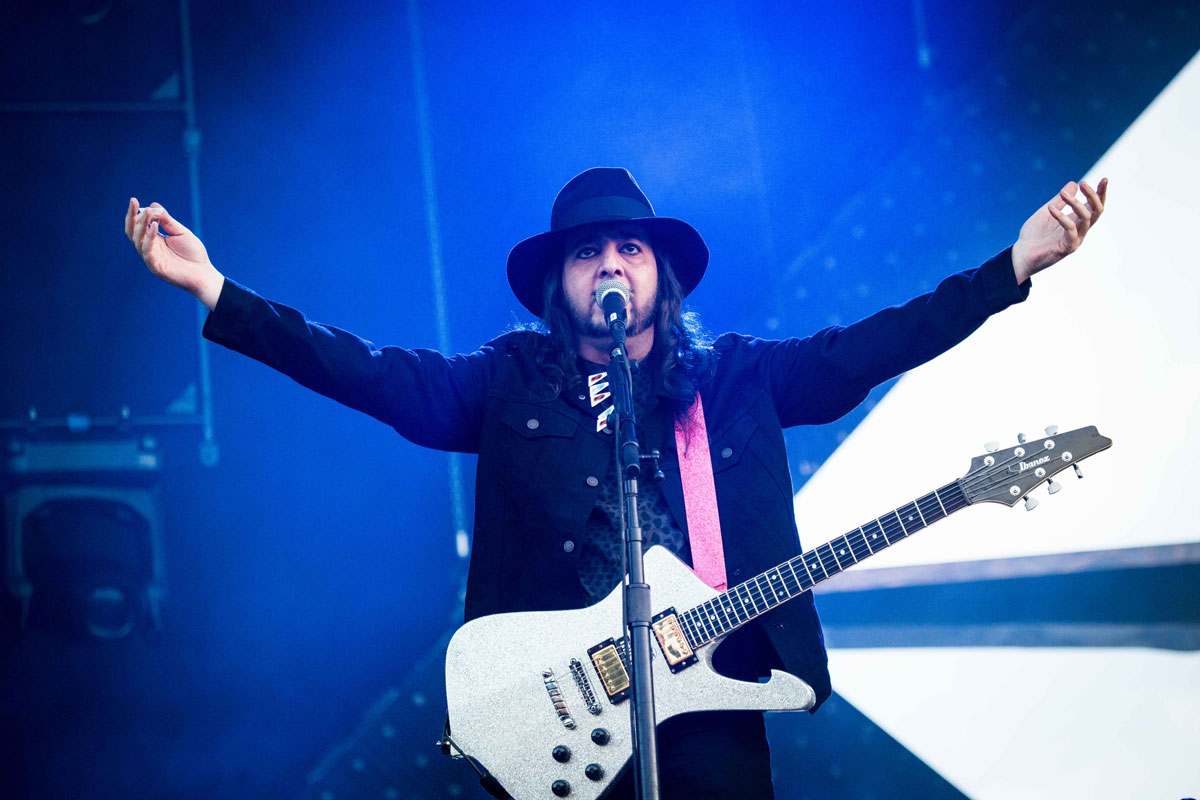
So what’s your main approach to writing the metal anthems SOAD are famous for?
“I guess I’m more focused on writing arrangements and vocals. I don’t write a riff and bring it to the band saying, ‘Hey check out this, what do you guys think?’ and everyone goes and plays whatever they want over it. Most of the songs you’ve heard in SOAD are songs I had already structured on my own and then brought into the band…
“Song arrangement and song writing are where my strengths are, rather than my guitar playing or shredding. It’s how I mix my vocal ideas with my riffs and with the drumbeat. Those are things I plan before I bring songs to the band.”
Well, you and Serj have very different voices, which is perhaps why they blend together so well…
“Yeah! We sound great together and the fans obviously think so too, which is why we’ve been so successful through the years – even considering how long it’s been without putting music out, it still amazes me that we go out there and play shows and our fans are still interested in the band. It’s very flattering and I’m very grateful for that.
Most of the songs you’ve heard in SOAD are songs I had already structured on my own and then brought into the band
“Especially when I was writing Mezmerize and Hypnotize, I was writing parts knowing this is where Serj would sing, this is where I would sing and here’s where we will sing together. I really have a lot of that stuff planned out before I even bring it to the band.”
What do you remember about writing the song many would call your biggest hit, Chop Suey!?
“I started writing that one when we were still in an RV, before we even had our first tour bus. I had this little bed in the back and was jamming on a guitar as we were driving down the road while on tour. That’s where I remember I came up with the intro.
“It’s one where I pretty much arranged it all before presenting to the band. I remember there was a different set of lyrics that we changed… it was the exact same phrasing but different words during the verses. The choruses we kept the same, all the ‘Self-righteous suicide’ stuff.
“So yeah, I don’t remember what city or state we were in, but I was in the back of an RV. Toxicity wasn’t out yet, so obviously we were still an up-and-coming band at the time.”
So do you have an idea as to what kind of rig was used for the actual recording?
“No idea… that was a long time ago [laughs]! I have no clue. Probably some rental stuff, but I’m sure there was a Marshall in the mix. I did a lot more layering in those days, way more than I do now.
“So when you hear that song you hear all these acoustics and mandolin-sounding parts under those acoustics. But I don’t remember the exact gear I used.”
Players like you and Adam Jones from Tool took Drop-D riffing to new heights in the '90s and early noughties. What do you think is the trick to getting the most out of that tuning?
“As in how to write? I don’t know if I could teach anybody how to write [laughs] but I would say just be honest. It’s way easier how to explain how to play guitar. I would never know how to approach explaining how to write.
Listening to music and being interested in other people’s music is probably the most important part of what I do
“You have to take some influence out of things you are listening to at the time or things that have happened. For me, I find the most important part of what I do is not playing or practicing… it’s listening.
“I’m a connoisseur of music – I love so many different styles and kinds. It’s not just heavy metal, it goes all across the board. You think of a genre and I will have dug into it, studied it and absorbed it. But just because I’m listening to the blues right now doesn’t mean I’m going to write a blues song. Two years later, however, something I was listening to back then will bleed out of me as I play.
“It all happens in a real organic and natural way. I don’t force anything, it just accidentally comes out of me a couple of years after going through some gothic phase or electronic phase. You know what I mean?
“Listening to music and being interested in other people’s music is probably the most important part of what I do. It affects me in the sense that it brings out things in my writing and style.”
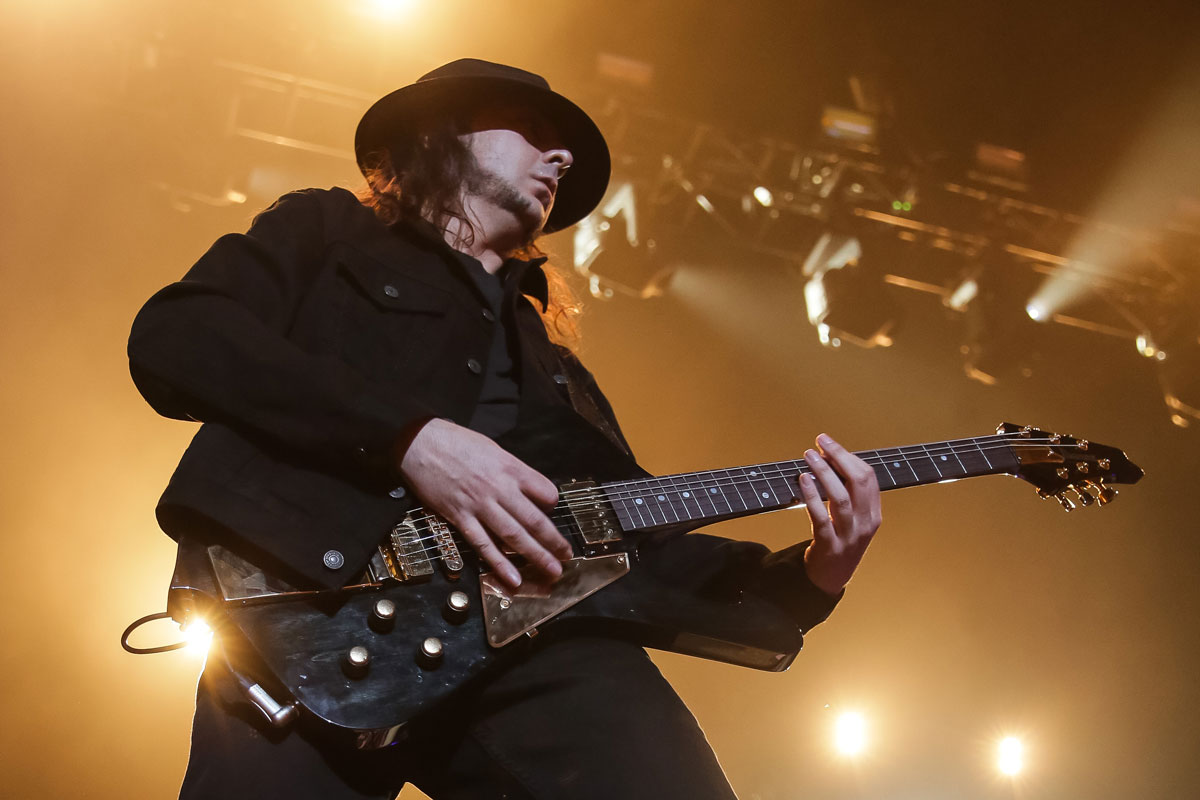
We have to ask – what do you think are the chances of more new music from SOAD in the near future?
“Look, I never say never. We didn’t even know this was going to happen. I was on my way to releasing these songs with my other band Scars On Broadway. Then the situation in Armenia happened and put our differences aside. And our differences are only within the band.
“Personally and outside of the band, everybody gets along reasonably well. There is no hate for each other in SOAD. We’re like a family. A lot of people think, ‘Oh, Serj and Daron don’t get along!’ and no, that’s not true. Serj and Daron get along just fine.
“But Serj and Daron, or Shavo and Serj, different people in the band will have a different idea of how they want the band to move forward. That’s kinda where our disagreements are at.”
So there’s definitely a chance it could happen…
“I never say never but at the same time I’m not expecting to do any more with SOAD right away or immediately after this. It really does seem like our fans like these new songs. That’s important to me.
That’s what it’s all about – inspiring people and future generations to continue the art, the spirit and the evolution of rock and roll
“We’ve added two new songs to the System catalog that are on the level with everything else that we’ve put out and our fans have accepted it that way, which means a lot to me.
“That’s kinda where we’re gonna leave it for now. If more happens later on, then we’ll talk about that, but for now I will continue doing what I’m doing and everyone else will just continue what they’re doing. It’s all cool though, I’m really pleased with the response we got.”
My first rock show was SOAD at London Astoria in 1999 as a young teenager. It was a life-changing experience in so many ways…
“That’s what it’s all about, Amit. If what we’re doing changes your life to the point where you are doing something now with music and enjoying a life working in music, that’s amazing. If me and my band contributed to that… well that’s great to hear, man. That’s awesome.
“And that’s what it’s all about – inspiring people and future generations to continue the art, the spirit and the evolution of rock and roll. I remember those early shows at the Astoria well.
“We played there once with Slayer and then came back to headline not long after. It was very cool for us to go from the opening band to headline band in such a short space of time!”
Protect The Land and Genocidal Humanoidz are available to buy from Bandcamp – all band royalties will be donated to the Armenia Fund.
Amit has been writing for titles like Total Guitar, MusicRadar and Guitar World for over a decade and counts Richie Kotzen, Guthrie Govan and Jeff Beck among his primary influences as a guitar player. He's worked for magazines like Kerrang!, Metal Hammer, Classic Rock, Prog, Record Collector, Planet Rock, Rhythm and Bass Player, as well as newspapers like Metro and The Independent, interviewing everyone from Ozzy Osbourne and Lemmy to Slash and Jimmy Page, and once even traded solos with a member of Slayer on a track released internationally. As a session guitarist, he's played alongside members of Judas Priest and Uriah Heep in London ensemble Metalworks, as well as handled lead guitars for legends like Glen Matlock (Sex Pistols, The Faces) and Stu Hamm (Steve Vai, Joe Satriani, G3).

